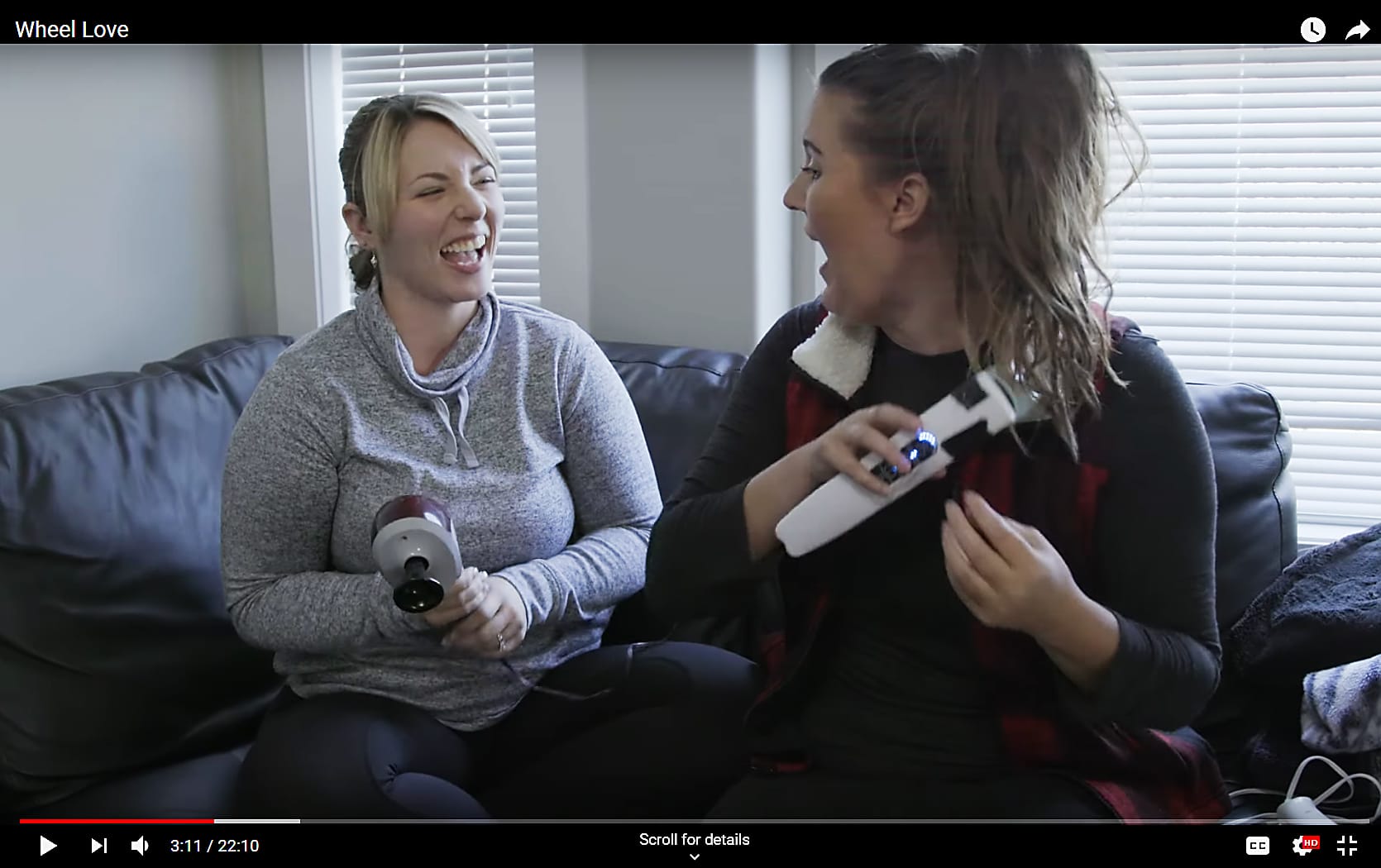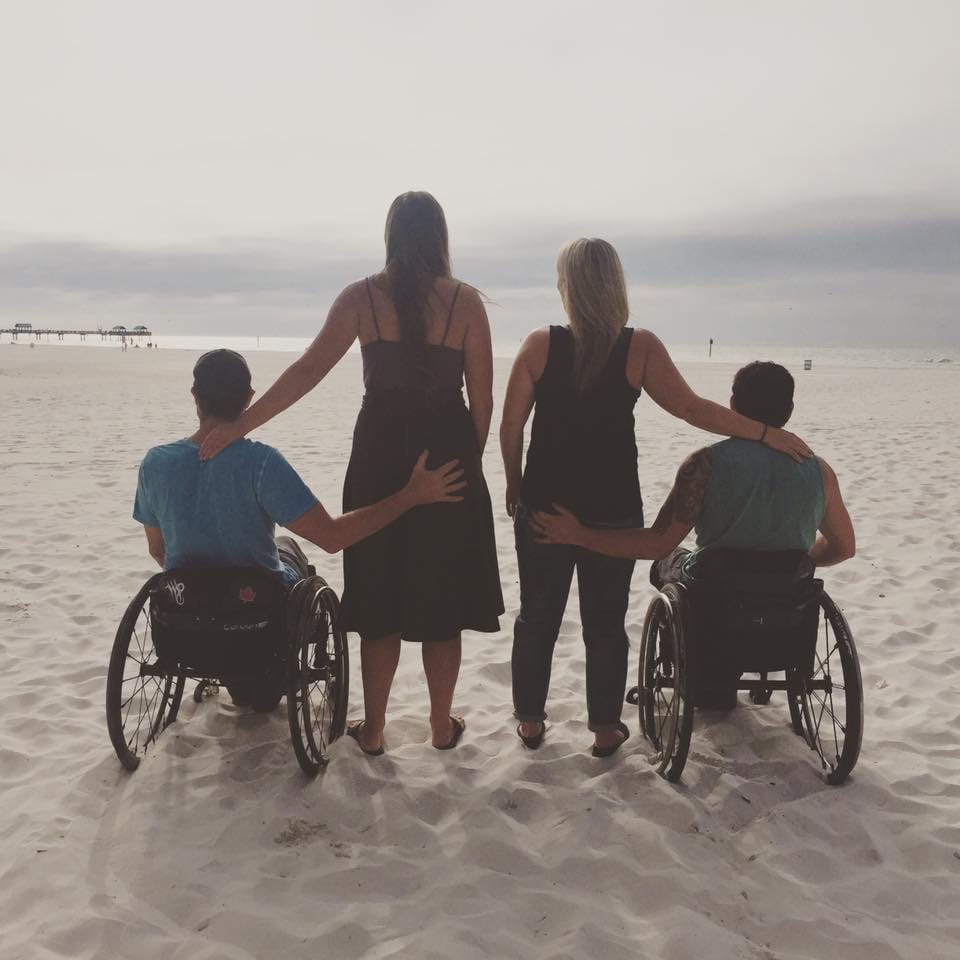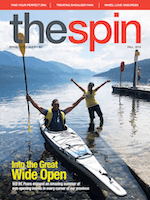Whether you’re a Peer interested in relationships and having a family, or just someone who appreciates stellar film-making, you don’t want to miss a compelling new short documentary conceived and produced by Kelowna’s Chelsea McEvoy.

Three years ago, Chelsea McEvoy and Samantha (Sam) Baxter realized, when it comes to real world insights about love and relationships involving a partner with an SCI, the internet is lacking. So the two friends, who live in Kelowna, created Wheel Love—a brilliantly-written blog based on their experiences as women in love with men who have an SCI.
“When I first started my relationship with James, of course there was the excitement that comes with new love, but what also followed was unexpected isolation,” says McEvoy. “No one could relate and no one could laugh or cry with me as this new relationship evolved. I then turned to Sam. She was dating Shawn, a T4 paraplegic. After our first coffee together, we instantly knew we had a long-lasting connection and something special. Many coffee dates later, we realized others may be feeling alone. The Wheel Love blog was born.”
McEvoy accepted from the beginning that she and Baxter would have to open up about deeply personal experiences for the blog to have any impact. But she had no idea, just a few years later, she’d be doubling down on the soul-baring by turning the spotlight and video camera on some of the most intimate parts of her relationship with James Hektner, a Peer with T6/7 paraplegia.
“After a few years of trying to conceive from home, James and I decided to get help and seek out fertility clinics. As a documentary filmmaker, I found this process fascinating and started to film our journey. I never thought anyone would see the footage; I shot it to remind us of the process and moment in time. Then I came across a Telus Storyhive grant opportunity and thought, “What the heck?” I put together a teaser trailer of what we shot so far, and guess what? We got the grant!”
The goal was to chronicle a very real and emotionally-charged process of trying to conceive in the challenging circumstance of a male partner having an SCI. “In all honesty, I did not want our journey to be exposed to the world,” she says. “But hey—if we weren’t going to do it, who was?”
McEvoy quickly recognized that, as much as she wanted to, there was no way she could direct the documentary while revealing so much of her personal life with Hektner. So she hired longtime friend and Kelowna filmmaker Ryan Tebbutt.
“Ryan did an amazing job directing this film,” she says. “It’s an emotional topic. Infertility brings out so many emotions I didn’t even know I had. Ryan created a safe space for James and I to open up and feel all the feelings. The emotion and vulnerability is what makes this film unique, powerful and special.”
The documentary, also titled Wheel Love, is 23 minutes long. It tells McEvoy’s and Hektner’s story as they struggle to capture viable sperm and conceive through intrauterine insemination.
But it’s also much more—their story is beautifully interwoven with interviews with 11 couples from across the Okanagan, all with one of the partners having an SCI or other disability, who have children.
“It was very important for James and I to incorporate our amazing community of Peers,” says McEvoy. “The Okanagan has such a special community of Peers and their partners who I am happy and blessed to call my friends. Like James and I, these couples thrive on educating and helping others going through similar struggles. This is not just our story; this is a story told by many. We will forever be grateful to them for allowing us into their lives and answering so many personal questions. It was so imperative for us to showcase other people’s stories because, just as no SCI is the same, no one’s journey is the same—but we can all share the same pain and emotion.”
While emotions run raw at times in the documentary, McEvoy says it was vital to stay away from ‘inspiration porn.’ “We are here to educate, not inspire, and I feel we all did an excellent job,” she says.
One way this was achieved was via generous injections of humour. For example, in the scene pictured to the right, McEvoy and Baxter have an on-camera discussion about the vibrators they use to come up with viable semen samples.

“They’re vibrators, and they’re used to make our partners ejaculate,” says McEvoy to the camera. “I don’t even know why it’s duct-taped!”
“James and I have gotten through a lot of difficult times using laughter and joy,” says McEvoy when asked about this exchange. “Our community of Peers in Kelowna pride themselves on using humour to mentor those with new injuries or get through tough situations. I honestly believe laughter in film is the best tool. And let’s be honest—some of this stuff is just naturally hilarious!”
The documentary is also that much more captivating because it’s beautifully shot and edited, with audio and soundtrack equally as compelling as the visuals.
“Other than humour and staying away from ‘inspiration porn,’ our biggest priority was production value,” explains McEvoy. “The quality of this film is a testament to the amazing crew behind the scenes. Ryan not only directed this thing, he was behind the camera as well. His creative eye and camera work inspires me. A film is also only as good as it sounds, so a big shout out goes to Mike Pedersen from Mountain Stream Audio for making it sound so good. Production value is by far the most important consideration in creating a film—if it looks good and sounds good, people are going to watch it.”

McEvoy hopes people around the world will watch the documentary and get something out of it. But she’s particularly hopeful SCI BC Peers will view and benefit from it.
“I hope readers of The Spin just enjoy this film. I hope it can help someone realize they’re not alone, and they’re surrounded by people who can relate to them. I hope it can encourage someone with a new injury to not give up on love or the dream of starting a family. I hope it can reassure someone that they can raise a family or continue being a parent. I also hope it can break some stigmas held by the able bodied community.”
As for the couple’s success in achieving their goal? At the time of writing this feature, they’re still working to conceive. But that doesn’t mean the documentary has a sad ending.
“We’re still plugging along,” says McEvoy. “We have a journey ahead, and we will keep trying until we are successful in starting our family—or keep trying until we decide it’s time to move on. Either way, we’re happy to be going on this journey together. It’s happy, sad, frustrating, hilarious and messy, but with the right partner, it’s all about the adventure!”
Whatever the outcome, we wouldn’t be surprised to see a sequel to Wheel Love.
This article first appeared in our Fall 2019 issue of The Spin and has been edited for our blog. Read the full version alongside other stories, including:
- Relief at Last: Chronic Shoulder Pain
- The Breast Experience: Properly Fitting Bras
- Cabin Fever: BC Parks Debuts Accessible Cabins
- and more!



